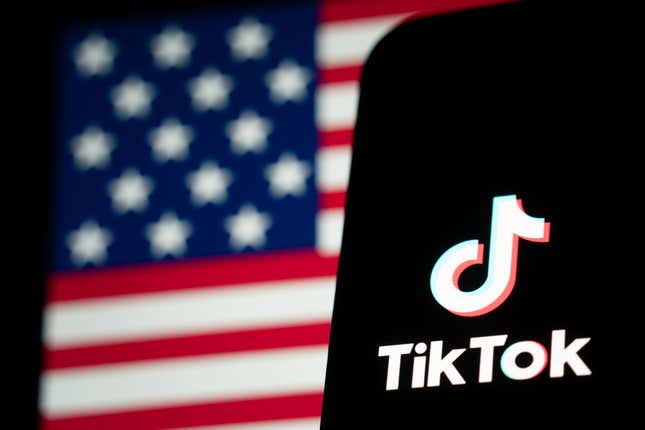
The nonstop barrage of tariff announcements has forced investors, CEOs, and ordinary Americans to become unwilling trade policy experts. Meanwhile, caught in the diplomatic crossfire: TikTok, the social video app that’s become both an economic bargaining chip and billionaire’s prize.
In the latest development, President Donald Trump confirmed Wednesday that a potential deal to spin off TikTok’s U.S. assets remains “on the table,” despite being temporarily put on hold. “We have a deal with some very good people, some very rich companies that would do a great job with it, but we’re going to have to wait and see what’s going to happen with China,” Trump told reporters in the Oval Office.
The president’s comments came the same day he announced a reversal on his sweeping tariffs, declaring a complete 90-day pause on all the “reciprocal” tariffs that had gone into effect at midnight — with the notable exception of China. In fact, Trump increased tariffs on Chinese goods from 104% to 125% after China announced additional retaliatory measures.
This economic pressure on Beijing could further complicate the already delicate TikTok negotiations.
Oracle co-founder Larry Ellison has emerged as a frontrunner in the race to acquire TikTok’s U.S. operations from Chinese parent ByteDance, The New York Times report. At 80, with a fortune estimated at $175 billion, Ellison appears to be assembling a media empire that could rival those of his fellow tech titans. Ellison’s son David is already close to acquiring Paramount in an $8 billion deal, suggesting a coordinated family strategy to gain prominence in the media landscape.
But the TikTok saga is about much more than one billionaire’s ambitions. It represents a fundamental shift in how wealth, technology, and political influence intersect in America today.
When Elon Musk acquired Twitter (now X) in 2022, he ripped off the mask of algorithmic neutrality, transforming a mainstream social media platform into his personal megaphone. By forcing his posts to the top of feeds, elevating like-minded voices, and driving critics off the platform, Musk revealed the raw power of ownership. Although algorithmic favoritism had long been suspected across platforms, Musk’s unapologetic approach dispensed with the pretense of neutrality that tech companies had carefully maintained.
That lesson wasn’t lost on America’s billionaire class. The feeding frenzy for TikTok — with bids reportedly coming from Amazon, Blackstone, and even a crypto-backed proposal from OnlyFans founder Tim Stokley — suggests that many of America’s wealthiest individuals now see social media ownership as essential to their influence.
Trump’s role in this process cannot be overstated. After returning to office, the president positioned himself as TikTok’s ultimate decision-maker, despite a law mandating that the app be banned in the U.S. unless ByteDance sold it to an American owner.
Trump initially signed an executive order extending ByteDance’s deadline by 75 days, and has now pushed it further to June 19, effectively making himself the arbiter of TikTok’s future in America. His escalating tariff war with China — while offering relief to other trade partners for now — has created an economic backdrop that makes the TikTok deal inseparable from broader U.S.-China relations.
“The tariffs give us great power to negotiate,” Trump told reporters last week.
Trump has remained steadfast in his support of a deal that would keep the app available to its 170 million American users. Most tellingly, when asked about potential buyers for TikTok, Trump previously volunteered: “I’d like Larry to buy it,” referring to Ellison, who has grown increasingly close to the president in recent years. Trump also said he would be open to Musk being the buyer.
Not that tariffs are the only hurdle to clear. Senators like Tom Cotton (R-Ark.) have come out against the deal and suggested there would be repercussions if ByteDance was allowed to keep a stake in TikTok after the sale, as some reporting suggests it would.
“American businesses and investors who want to dip their beaks in the golden TikTok fountain should think twice before giving their money and their good name to Chinese Communists,” Cotton said Wednesday on the Senate floor. “If the TikTok deal maintains any operational relationship with China, you’ll be stuck with the consequences. Caveat emptor.”
If Ellison succeeds in acquiring TikTok and overcoming the legal challenges, America will have completed a remarkable transformation of its media landscape. Just two decades ago, traditional media companies and regulated broadcasters dominated public discourse. Today, a handful of tech billionaires increasingly control what Americans see, read, and discuss.
Musk has X. Mark Zuckerberg controls Facebook, Instagram, and WhatsApp. Jeff Bezos owns The Washington Post, and Amazon, the company he founded, has a growing advertising and streaming business. And now Ellison may soon add TikTok to a family portfolio that could include Paramount’s film studios, CBS, and MTV.
This concentration of media power in the hands of a few extraordinarily wealthy individuals raises profound questions about American democracy. When the ability to reach hundreds of millions of citizens is controlled by people with clear political affiliations and personal agendas, what happens to the marketplace of ideas?
For American TikTok users, the platform’s entertaining videos and creative content may continue uninterrupted until at least June 19, regardless of who eventually owns it. But beneath that endless scroll, something essential is changing about how information flows in our society.
—Jackie Snow, Contributing Editor